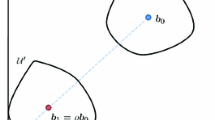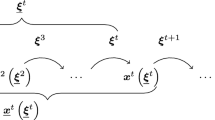Abstract
We consider a two-stage adaptive linear optimization problem under right hand side uncertainty with a min–max objective and give a sharp characterization of the power and limitations of affine policies (where the second stage solution is an affine function of the right hand side uncertainty). In particular, we show that the worst-case cost of an optimal affine policy can be \({\Omega(m^{1/2-\delta})}\) times the worst-case cost of an optimal fully-adaptable solution for any δ > 0, where m is the number of linear constraints. We also show that the worst-case cost of the best affine policy is \({O(\sqrt m)}\) times the optimal cost when the first-stage constraint matrix has non-negative coefficients. Moreover, if there are only k ≤ m uncertain parameters, we generalize the performance bound for affine policies to \({O(\sqrt k)}\), which is particularly useful if only a few parameters are uncertain. We also provide an \({O(\sqrt k)}\) -approximation algorithm for the general case without any restriction on the constraint matrix but the solution is not an affine function of the uncertain parameters. We also give a tight characterization of the conditions under which an affine policy is optimal for the above model. In particular, we show that if the uncertainty set, \({{\mathcal U} \subseteq {\mathbb R}^m_+}\) is a simplex, then an affine policy is optimal. However, an affine policy is suboptimal even if \({{\mathcal U}}\) is a convex combination of only (m + 3) extreme points (only two more extreme points than a simplex) and the worst-case cost of an optimal affine policy can be a factor (2 − δ) worse than the worst-case cost of an optimal fully-adaptable solution for any δ > 0.
Similar content being viewed by others
References
Bemporad A., Borrelli F., Morari M.: Min–max control of constrained uncertain discrete-time linear systems. IEEE Trans. Autom. Control 48(9), 1600–1606 (2003)
Ben-Tal, A., Boyd, S., Nemirovski, A.: Control of uncertainty-affected discrete time linear systems via convex programming. Technical report, Minerva Optimization Center, Technion, Haifa, Israel. SIAM J. Control Optim. (submitted, 2005)
Ben-Tal A., Boyd S., Nemirovski A.: Extending the scope of robust optimization: comprehensive robust counterparts of uncertain problems. Math. Program. 107(1), 63–89 (2006)
Ben-Tal A., Goryashko A., Guslitzer E., Nemirovski A.: Adjustable robust solutions of uncertain linear programs. Math. Program. 99(2), 351–376 (2004)
Ben-Tal A., Nemirovski A.: Selected topics in robust convex optimization. Math. Program. 112(1), 125–158 (2008)
Bertsimas D., Brown D.B.: Constrained stochastic LQC: a tractable approach. IEEE Trans. Autom. Control 52(10), 1826–1841 (2007)
Bertsimas D., Goyal, V.: On the Power of Robust Solutions in Two-Stage Stochastic and Adaptive Optimization Problems. Math. Oper. Res. 35(2), 284–305 (under review)
Bertsimas, D., Iancu, D.A., Parrilo, P.A.: A hierarchy of near-optimal policies for multi-stage adaptive optimization. Submitted to IEEE Trans. Autom. Control (under review)
Bertsimas D., Iancu D.A., Parrilo P.A.: Optimality of affine policies in multistage robust optimization. Math. Oper. Res. 35(2), 363–394 (2010)
Dhamdhere, K., Goyal, V., Ravi, R., Singh, M.: How to pay, come what may: Approximation algorithms for demand-robust covering problems. In: Annual Symposium on Foundations of Computer Science, vol. 46, pp. 367–376 (2005)
Feige U., Jain K., Mahdian M., Mirrokni V.: Robust combinatorial optimization with exponential scenarios. Lect. Notes Comput. Sci. 4513, 439–453 (2007)
Goulart, P.J., Kerrigan, E.C.: Relationships between affine feedback policies for robust control with constraints. In: Proceedings of the 16th IFAC World Congress on Automatic Control (2005)
Kerrigan, E.C., Maciejowski, J.M.: On robust optimization and the optimal control of constrained linear systems with bounded state disturbances. In: Proceedings of the European Control Conference (2003)
Khandekar, R., Kortsarz, G., Mirrokni, V., Salavatipour, M.: Two-stage robust network design with exponential scenarios. In: Proceedings of the 16th Annual European Symposium on Algorithms, pp. 589–600. Springer, New York (2008)
Kuhn, D., Wiesemann, W., Georghiou, A.: Primal and dual linear decision rules in stochastic and robust optimization. Math. Program. 1–33 (2009)
Lofberg, J.: Approximations of closed-loop minimax MPC. In: Proceedings of the 42nd IEEE Conference on Decision and Control, vol. 2 (2003)
Rockafellar R.T., Wets R.J.B.: The optimal recourse problem in discrete time: L 1-multipliers for inequality constraints. SIAM J. Control Optim. 16, 16–36 (1978)
Skaf J., Boyd S.: Design of affine controllers via convex optimization. IEEE Trans. Autom. Control 55, 2476–2487 (2010)
Author information
Authors and Affiliations
Corresponding author
Additional information
Research is partially supported by NSF Grants DMI-0556106, and EFRI-0735905.
Rights and permissions
About this article
Cite this article
Bertsimas, D., Goyal, V. On the power and limitations of affine policies in two-stage adaptive optimization. Math. Program. 134, 491–531 (2012). https://doi.org/10.1007/s10107-011-0444-4
Received:
Accepted:
Published:
Issue Date:
DOI: https://doi.org/10.1007/s10107-011-0444-4




